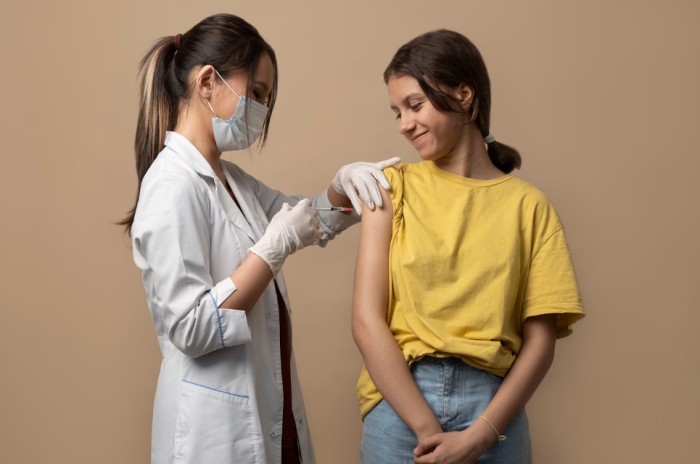IMANA NEWS
Debunking Myths About Vaccines
23 October 2023

Vaccinations are instrumental in controlling and eradicating all kinds of deadly diseases. However, a substantial number of people are hesitant to get vaccinated or refuse to get them altogether.
The resurgence of anti-vaccine groups was especially evident in response to the COVID-19 vaccines as people were hesitant to receive them for several reasons.
With widespread misconceptions and misinformation posing a significant threat to global health, it is important to debunk myths about vaccines with scientific evidence.
Why Have Anti-Vaccination Sentiments Re-Emerged?
Opposition to vaccines isn’t new. Anti-vaccine groups have existed for as long as vaccination has been around.
The history of vaccines is riddled with conflict and controversy due to several reasons such as:
Historical Context and Misinformation
Concerns about the safety and effectiveness of vaccines continue to be fueled by misconceptions and misinformation. The spread of misleading information and myths about vaccines is exacerbated by social media as it provides a platform for anti-vaccine groups to amplify their message.
Mistrust in Authorities
A lack of trust in healthcare providers, government agencies, and pharmaceutical companies has significantly contributed to anti-vaccine sentiments.
Perceived conflicts of interest, lack of transparency, and past malfeasance have impacted public trust and made individuals more susceptible to anti-vaccine propaganda.
Social Media
Social media algorithms tend to create echo chambers that reinforce and amplify certain narratives, creating a sense of community or validation that strengthens the stance of hesitant individuals.
Social media platforms have enabled anti-vaccine groups to rapidly and easily spread their agenda and misinformation among a wider audience.
Which Diseases Have Been Eradicated By Vaccinations?
Despite the misconceptions surrounding vaccines, they have played a pivotal role in improving global health by eradicating several deadly diseases and infections.
These include diseases such as:
Smallpox
The smallpox vaccine was the first to be widely deployed. The disease was eliminated in 1979. The development of vaccines as a public health tool was first attributed to Edward Jenner’s experiments with cowpox in 1796 which contributed towards the development of the smallpox vaccine.
Smallpox was thus the first disease that was addressed by large-scale vaccinations.
Rabies
Developed by Pasteur and first tested on a human being in 1885, the rabies vaccine continues to be a crucial aspect of disease prevention and control even today.
Measles, Mumps, and Rubella (MMR)
The MMR vaccine helps prevent outbreaks and complications associated with measles, mumps, and rubella such as encephalitis and congenital rubella syndrome.
Haemophilus Influenzae Type b (Hib)
Hib vaccines protect against Haemophilus influenzae type B (Hib) which can cause serious illnesses such as meningitis and pneumonia.
Hepatitis B
The Hepatitis B vaccine significantly reduced Hepatitis B infections across the world which are linked to cirrhosis, liver cancer, and other severe liver diseases.
What Are the Common Myths About Vaccines?
Some of the most common myths about vaccines are, unfortunately, often rooted in fear and paranoia instead of scientific evidence or factual information.
Vaccines Cause Autism
The most enduring and widespread myth about vaccines links it to autism, particularly the MMR vaccine.
However, extensive research has debunked this claim. No credible scientific evidence supports the connection between vaccines and autism spectrum disorder while the author who first claimed that vaccines cause autism has been discredited.
Vaccines Contain Harmful Ingredients
Individuals often fear that vaccines may contain harmful or dangerous ingredients. However, vaccines are designed to promote public health so the ingredients are carefully studied and assessed by regulatory agencies.
Each component serves a purpose: to provide immunity, enhance the effectiveness of the vaccine, or to keep it safe, stable, and long-lasting.
Natural Immunity Is Superior
While natural infections can provide immunity, vaccines reduce the risks and potential complications associated with different diseases and are thus safer for building immunities.
Natural immunities may also be weak or unable to fight against certain viruses in which case vaccines provide necessary, life-saving protection.
Vaccines Weaken the Natural Immunity
Vaccines are often believed to weaken immunity, but in reality, they strengthen the natural immune system. They are designed to enhance the immune response by training the system to recognize and fight pathogens without causing the disease.
This helps bolster a community’s ability to respond to infections effectively, thus reducing the severity of the disease.
How Health Professionals Can Respond to Myths About Vaccines
Dispelling myths about vaccines is important to ensure that public health is maintained and future outbreaks are prevented.
A common factor in all the myths about vaccines, including the theory that the COVID-19 vaccine embeds a microchip in the body, is that they are founded on fear and misinformation.
It is thus important for healthcare professionals to educate people about the importance and safety of vaccines.
This can be achieved through:
Collaborations With Educators and Schools
Medical professionals and educators can collaborate to counter vaccine misinformation in schools. This ensures that students and their families are made aware of their importance.
Telehealth Programs
Telehealth is a powerful tool for reaching a broader audience and providing accurate, accessible vaccine education. Conducting webinars, posting infographics on social media, live discussions on various platforms, and virtual Q&A sessions can go a long way in dispelling myths and spreading awareness.
IMANA’s Fall Health Check earlier in October is an excellent example.
Community Engagement
Healthcare professionals can also interact and engage with their local communities to understand and address ongoing concerns and misinformation.
This can be achieved by distributing flyers, organizing discussions, or hosting vaccination drives with an expert present who can answer queries and provide information.
Final Thoughts
Myths about vaccines can seriously hinder disease control and prevention. They may have grievous consequences and must thus be actively addressed.
As most myths are a result of a lack of awareness and accessibility to information, education about vaccines can go a long way.
The Islamic Medical Association of North America (IMANA) offers free health education resources to promote a better understanding of healthcare and medicine, including vaccinations.